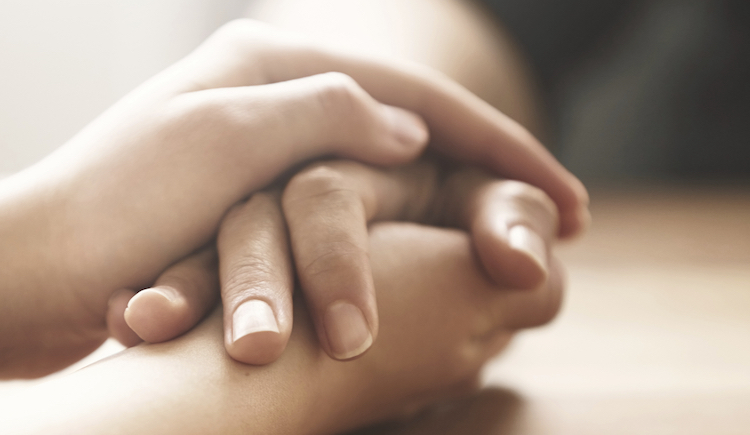It’s overwhelming when you can’t shake the sadness of losing someone or something. Manage your grief with these helpful tips from Donna Lancaster, a passionate life coach and relationships expert
Grief is a natural reaction to any kind of loss. It’s the norm, and sometimes conflicting feelings are caused by loss. It is usually associated with the death of someone we love, a partner, family member, friend or pet. However, there are many other life experiences that can produce grief, such as miscarriages, major health changes, moving location or loss of opportunities.
Grief is a fundamental part of the human condition. We grieve all of life’s losses, not just bereavement. These endings are also a kind of death, bringing with them deep sorrows that require time and space to heal. Such ‘deaths’ involve losing aspects of ourselves and they can happen not just a few times in our lifetime, but monthly, weekly and even daily.
life experiences that can produce grief include miscarriages, major health changes, moving location or loss of opportunities
We all experience loss many times in our lives but for most of us we have been socialised to believe that expressing these feelings is abnormal or wrong in some way. Over time the pain of unresolved grief is cumulative and can have a lifelong impact on a persons capacity for happiness. Depressive mood, hopelessness and anxious feelings are common reactions to unprocessed grief.

I believe we need to honour these losses in the same way that we mark the gains in our lives, because both events fundamentally change us. You could say that, just as we celebrate the ‘comings’ of life, such as an 18th birthday, marriage and childbirth, we also need to honour the ‘goings’.
We need to honour these losses in the same way that we mark the gains in our lives, because both events fundamentally change us
Whilst we have the ritual of funerals to help us through the loss of friends and family, we are rarely taught how to honour and let go of other hurts, losses and betrayals in ways that are healthy for us. The result is that many of us store up this grief, accumulating them year after year until, in our middle adult years, we find ourselves bursting with a pain so great that we can not even contemplate examining it.
Instead, many of us simply batten down the hatches of our heart and endure. The result is that our life becomes smaller, shallower and narrower. Everything is less than it could be, including ourselves. This sense of ‘less than’ can mean not only that we lose our potential to thrive and make the most of our lives, but also that a coldness and bitterness of heart can set in. This is the reason why many of us walk around in a cloud of negativity and indulge in moaning, bitching and gossip, both at work and at home. But I believe such negative behaviour is often a sign of unexpressed hurt, sadness and pain, what the Psychotherapist David Richo calls ‘a poor man’s grief’? The impact of this avoidance can be far-reaching.
The truth is that failure to process the impact of major life challenges can result in symptoms that look very similar to depression

In my work as a coach and facilitator of personal development programmes I have worked with hundreds of people who describe themselves, or have been diagnosed, as ‘depressed’ or ‘anxious’. And I have found again and again over the years that for many people this is a misdiagnosis because what they are really suffering from is unprocessed grief.
The truth is that failure to process the impact of major life challenges can result in symptoms that look similar to depression. This is of course not to deny that some people have clinical depression or anxiety disorders. What I am suggesting is that there are others who sense that they are misdiagnosed, or who believe they are depressives, but in fact are suffering from a failure to turn and face specific issues of loss in their life that can actually be resolved and in the process save themselves from a lifetime of pain and suffering.
But, how to tell the difference? In my experience, if people are allowed a safe and nurturing space to express and make sense of blocked emotions arising from past hurts, betrayals and losses, what happens is this, quite simply, they get better.
Here are my top ten tips to help deal with the feelings of grief.
1. Learn to be honest
Acknowledging to yourself and trusted others the full range of feelings you are experiencing. It’s so important not to deny or ignore these feelings nor to push them away too often with distraction activities such as comfort eating, alcohol consumption, over working, over exercising and so on. These distraction activities may provide short term relief but they can actually delay the healing process and can extend the period of grieving.
2. Give yourself time and space

Allowing yourself the time and space to process your loss is key. Just as we stop and rest when we are sick, people need time to step out of their normal routine to allow the grieving process to flow. Of course it can feel easier to ‘get busy’ with activity but this does not allow the healing process to run its natural course. It is another kind of short term ‘fix’ which prevents completion and moving on in the longer term. If possible taking some time off work to do your ‘grief work’ can actually offer a faster and deeper route to recovering from the loss.
3. Be allowing
Grief is essentially made up of three main feelings:
1. Sadness – at what or who has gone away
2. Anger – at the unfairness, injustice, betrayal
3. Fear – that things will always feel/be this way. It is important that you allow yourself to experience all of these feeling states as they arise within you. The feelings can sometimes come in waves and you may go from one feeling state to another and back again. There is no set pathway.
4. Express yourself
Journaling and sharing your changing experience of the loss through therapy can also be very supportive
Write a letter to your lost one expressing all of your hopes and dreams, all your sadness, fear and anger. Externalising all your thoughts and feelings. This is a love letter from your heart to theirs. It allows you to ‘say the unbearable ‘ including goodbye. Once written it can be healing to read this letter to a trusted friend who will simply listen and hear you. Being witnessed in this way validates your experience and is another step on your healing journey. Journaling and sharing your changing experience of the loss through therapy can also be very supportive.
5. Use your body

Just as it is important to be able to write and speak about your loss, it is also key to express the loss through the body. For many of us a significant loss such as a miscarriage or bereavement can be experienced as a kind of trauma which can get trapped in the body. Using the body and voice to trigger and safely release emotions can aid the healing process. Walking, dancing, yoga, bashing of pillows all offer routes to express through the body. Touch is also very supportive; being held, cuddled, someone holding your hand, having a massage. Never underestimate the healing power of touch.
6. Try a ritual
Ritual has been used in many cultures for thousands of years to support people in processing loss. In some West African tribes they hold grief rituals for communities to come together to grieve their collective losses. The West African tribal leader Sobonfu Some says ‘grieving is an act of soul cleansing.
Grieving is an act of soul cleansing
By allowing ourselves to fully experience our grief, we can return to our true nature, our spirit. It can be a simple ritual of lighting a candle and looking at pictures of your lost love one. It can involve writing or drawing to express. You can create a small shrine in one area of the house with photos and mementoes. All of these rituals can support people in their grieving.
7. Create a sense of order
Just as children need structure to feel safe, when we are grieving a loss it helps to have a routine. A flexible structure to our days and evenings can support us to feel safe and with a sense of containment in our changing world. Whether it is a walk with the dog, daily bath rituals, coffee with friends…creating some sense of order can be helpful.
8. Eat healthy and look after yourself
Make sure you are eating healthy nutritious foods and drinking plenty of water. Basic advice, but so important. Also ensuring you get enough sleep even if this means napping in the day. Exercise is well known to aid a sense of well-being and balance.

9. Nature heals
Making time to get out in nature is a must. If possible make daily trips to the park, beach or woods. Notice which you are drawn to. Is it trees, mountains or the sea? Go there. Nature itself heals.
10. Stay connected
Although this is often a time people want to be alone, it is also important to stay in connection with significant others. Spend time with family and friends, people who will allow you to simply be with your grief without trying to change it. A listening ear and loving eye can make all the difference. And remember:
“Our wounds are often the openings into the best and most beautiful part of us.”
David Richo

Donna Lancaster is the founder and creator of thebridgeretreat.com and has been working with individuals, couples and groups for over twenty years. She is a registered member of the Health and Care Professions Council and has a degree in social work, specialising in child protection, and worked extensively within this and related fields for ten years. Donna is passionate about the subject of grief and the grieving process which she believes offers the missing link for many in their search for wholeness. This interest stemmed from her own very personal experience of depression which she suffered from for many years, and now knows to have in fact been unprocessed grief
Like this article? Sign up to our newsletter to get more articles like this delivered straight to your inbox.





















































